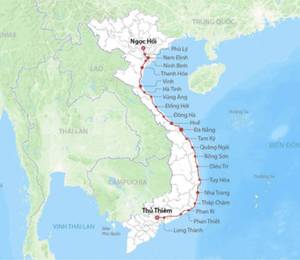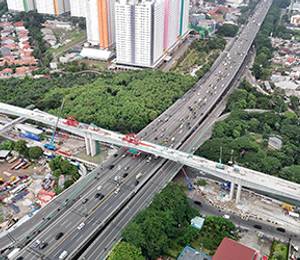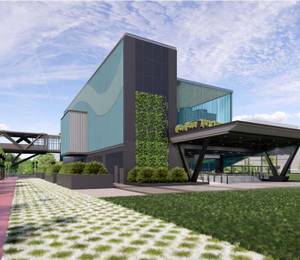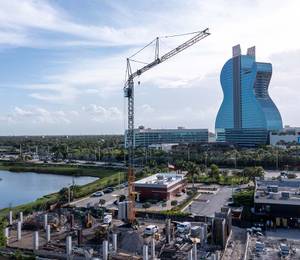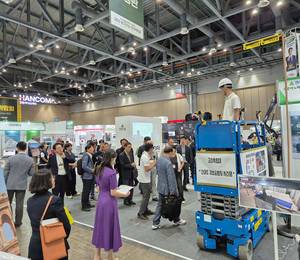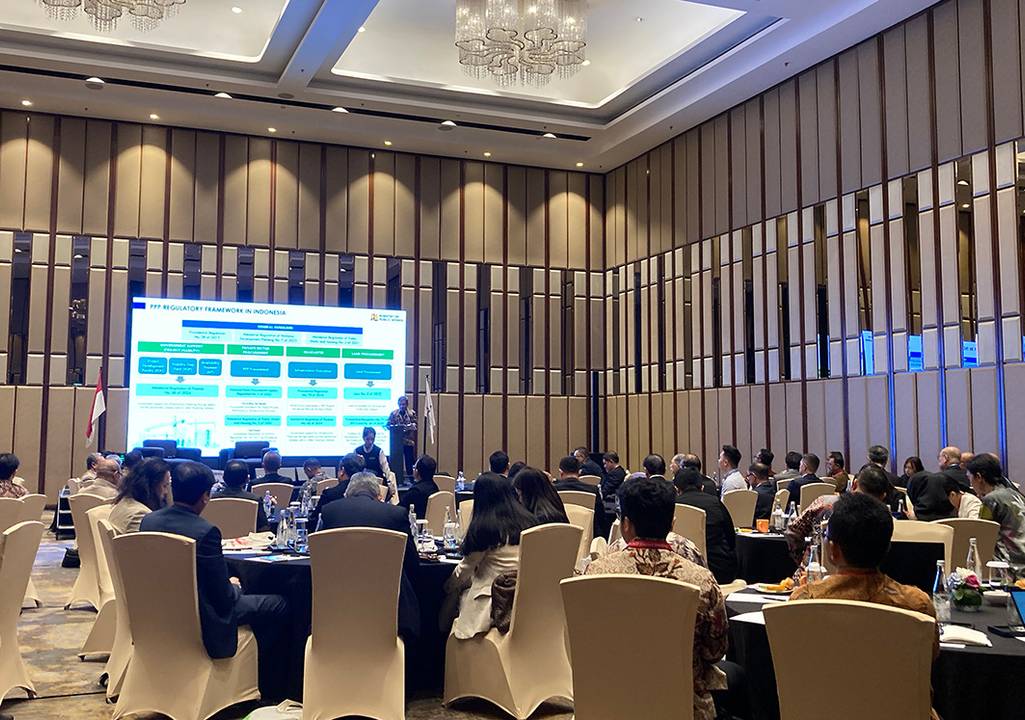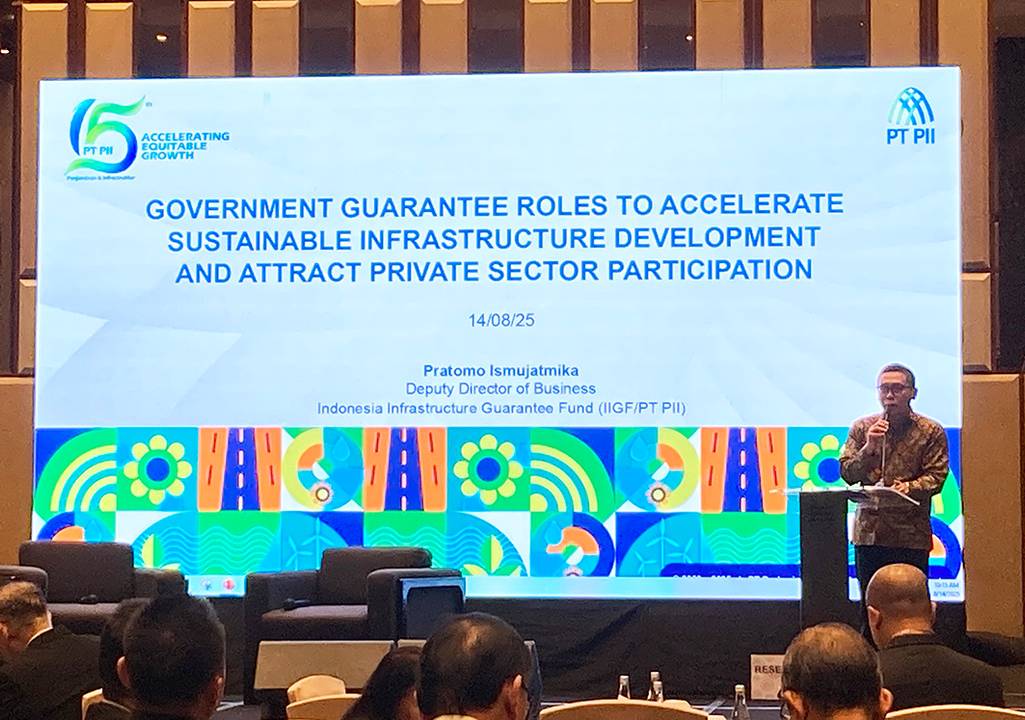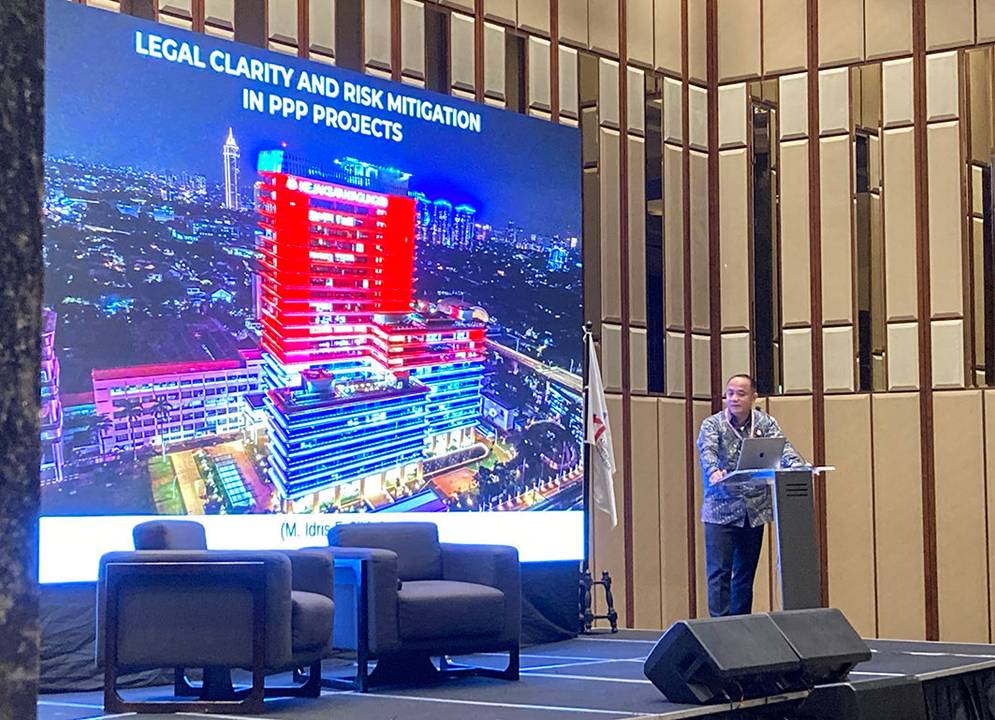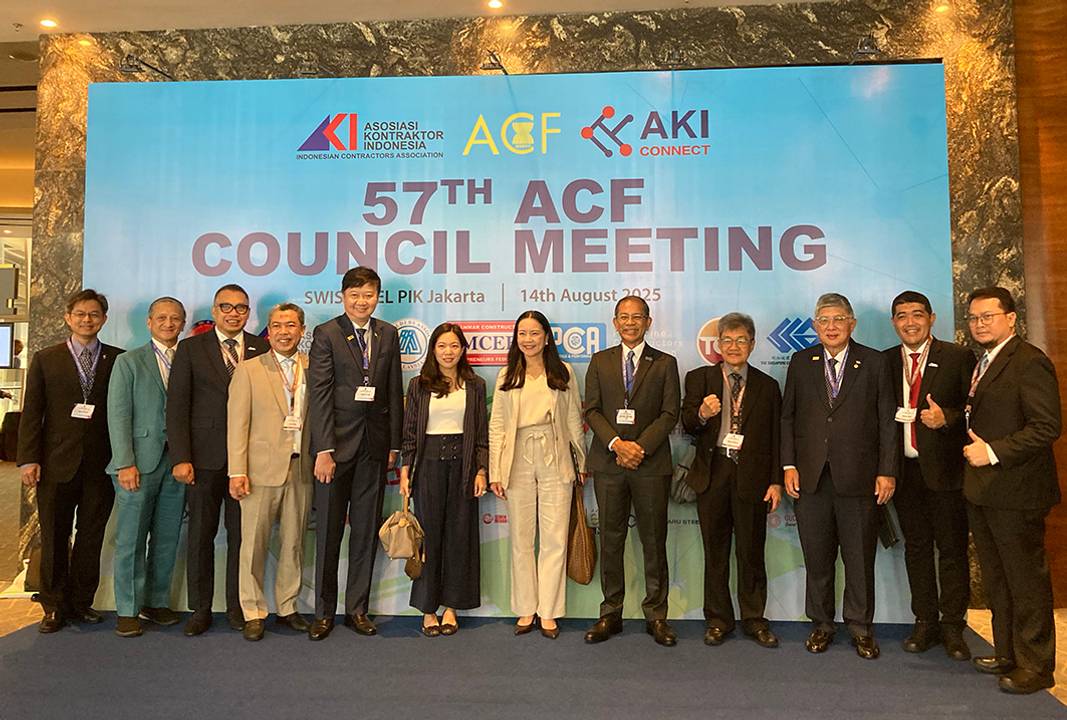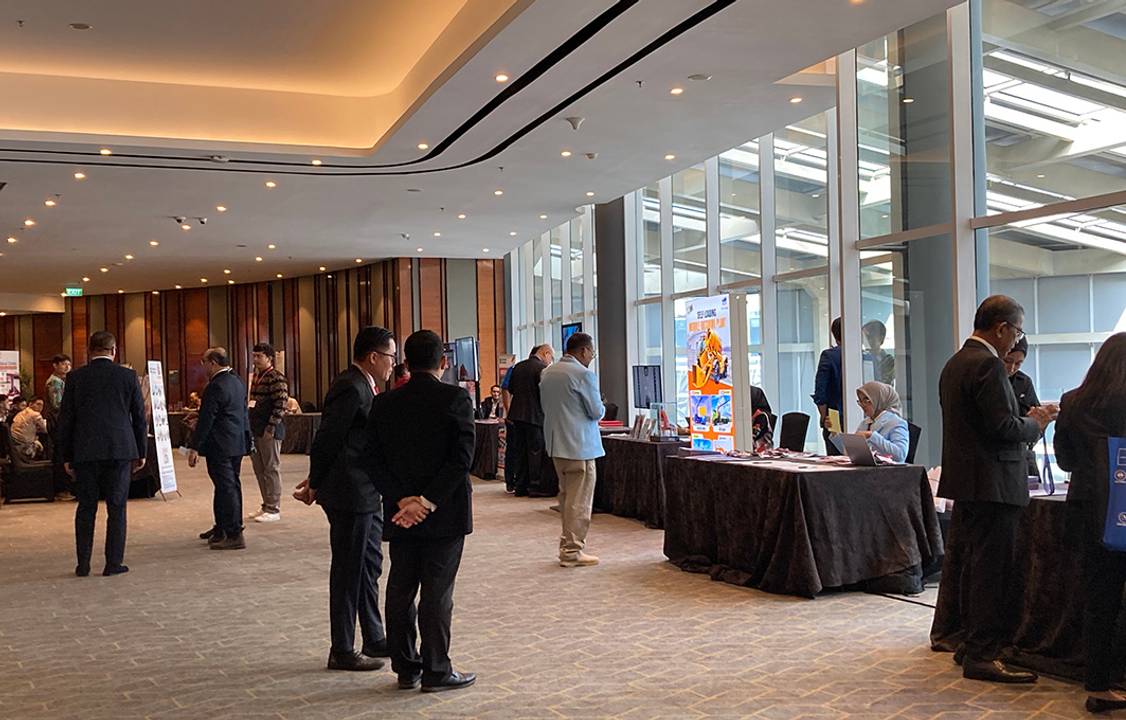“We meet at pivotal moments with shifting national priorities and reduced public funding for infrastructure. The role of the private sector has never been more crucial, yet the need remains immense,” said Muhammad Fauzan, secretary general of Indonesian Contractors Association (ICA), speaking at the opening of AKI Connect 2025 in Jakarta, Indonesia. The event took place on 14 August in conjunction with the 57th ACF (ASEAN Constructors Federation) Council Meeting.
“Many parts of Indonesia still require better transportation, energy and essential facilities. This is where collaboration, innovation and strategic investment become vital,” he pointed out. “We believe that by working together, locally and regionally, we can turn challenges into growth, strengthen our industries, and contribute to sustainable development in Indonesia and across ASEAN.”
AKI Connect 2025, hosted by ICA (Indonesian: Asosiasi Kontraktor Indonesia, or AKI in short), is a business matchmaking forum aimed to address emerging challenges in Indonesia’s infrastructure development and to attract both local and international partners through viable public-private partnership (PPP) projects.
Attendees at this exclusive event had the chance to connect with project owners and explore investment opportunities. There was also an exhibition area displaying innovative solutions and technologies for the local construction market.
Potential PPP projects open for private investment
Several government agencies provided detailed insights into Indonesia’s PPP projects, updated regulatory framework, and practical guidance for doing business in the country.
Agus Sulaeman of the Ministry of Public Works delivered his presentation on ‘Public Private Partnership: Strategy for Accelerating Infrastructure Development.’ He revealed the infrastructure targets and funding needs of the public sector between 2025 and 2029. The total budget requirement is estimated to reach Rp1,905.3 trillion (US$117,18 billion), with a funding gap of 39.53% that has to be covered.
To that end, the Indonesian government prioritises three PPP schemes: PPP with Userpay/Usercharge/Tariff Scheme; PPP with Availability Payment (AP) Scheme; and PPP with construction support (supported BOT).
Mr Sulaeman also explained the latest PPP regulatory framework in Indonesia, as well as different types of government support for PPP projects (namely Project Development Facility, Viability Gap Fund, support for AP Scheme, and Indonesia Infrastructure Guarantee Fund).
He further shared potential PPP projects available for private investment. These consist of mini hydropower plants and toll roads in various regions of the country:
-
Way Sekampung Mini Hydropower Plant, Lampung
-
Cipanas Mini Hydropower Plant, West Java
-
Tapin Mini Hydropower Plant, South Kalimantan
-
Leuwikeris Mini Hydropower Plant, West Java
-
Karalloe Mini Hydropower Plant, Sulawesi
-
South Sentul-West Karawang Toll Road, West Java
-
Pejagan-Cilacap Toll Road, Central Java
-
Gilimanuk-Mengwi Toll Road, Bali
In addition, Danis Hidayat Sumadilaga of the Nusantara Capital City Authority showcased the progress of Indonesia’s new capital city. “The development of Nusantara will continue,” he stated. “Moving forward, it will not be carried out by the government only, but it will also invite more participation from the private sector, either through private partnerships or direct investment.”
Government guarantees and legal risks mitigation
Pratomo Ismujatmika of Indonesia Infrastructure Guarantee Fund (IIGF) spoke on key challenges in Indonesia’s infrastructure development. These comprise: bureaucratic and regulatory complexity, creating uncertainty for private investors; limited state and regional budget financing for infrastructure development; lack of project planning and preparation, hindering project bankability; and complex land acquisition processes, delaying projects and increasing costs.
At the Indonesian Chamber of Commerce and Industry (KADIN) national conference in January 2025, Indonesian President Prabowo Subianto said that “the development of infrastructure in the country will largely be handed over to the private sector, as the private sector is more efficient, more innovative and more experienced.”
In his talk, ‘Government Guarantee Roles to Accelerate Sustainable Infrastructure Development and Attract Private Sector Participation,’ Mr Ismujatmika highlighted the role of IIGF. This state-owned enterprise helps increase certainty and convenience for investors and lenders by offering risk management, accountability, sustainability, bankability and transparency.
A Special Mission Vehicle (SMV) of the Ministry of Finance, IIGF supports the ecosystem of sustainable infrastructure financing. It acts as a fiscal tool of the government. As of January 2025, IIGF has been involved in issuing 35 government guarantees across different sectors, as well as 19 government guarantees for 11 state-owned enterprises.
In the next presentation titled ‘Legal Clarity and Risk Mitigation in PPP Projects’, M. Idris F. Sihite of the Attorney General Office shared the regulations that guide PPP projects in Indonesia – namely the Presidential Regulation No. 38/2015 and Regulation of the Government Goods/Services Procurement Policy Agency (LKPP) No. 1/2025.
He also discussed common legal risks in PPP projects, such as ambiguities in contract terms; unclear land acquisition and permits; regulatory/policy change risk during project lifecycle; insufficient risk allocation and bankability issues; and dispute resolution gaps and weak enforcement.
Mr Sihite then outlined a number of ways to help mitigate these legal risks. Concluding the presentation, he reiterated that “legal clarity is the foundation for successful PPP execution, early legal engagement prevents costly disputes, government support mechanisms strengthen project resilience, and proactive risk mitigation leads to timely, on-budget delivery.”
Successful projects
Djoko Sarwono, chairman of ICA, presented some successful PPP projects. One of them is the Palapa Ring, a national fibre-optic backbone network that connects all districts and cities across Indonesia. This is said to be the first PPP project in Indonesia’s telecommunications sector, implemented by the Ministry of Communications and Informatics. The other projects include the Umbulan and Bandar Lampung water supply systems, located in East Java and Lampung respectively.
The PPP initiative is “necessary considering the limitations of the state budget in funding infrastructure development, which results in a funding gap that must be filled,” stressed Mr Sarwono. “Therefore, there is a need for creative financing through private contributions to serve as an alternative source of funding and financing for the provision of infrastructure or public services.”
“In recent years, the government has increased support for PPPs, including greater transparency and accountability in the implementation of PPPs,” noted Mr Sarwono. However, he acknowledged that “improvements are still needed to enhance the effectiveness of PPPs in boosting the quality of infrastructure in Indonesia.”
Three prominent contractors (ICA members) were also speaking at the event, giving insights into their projects and capabilities. Ekwan Hadyanto of PT Hutama Karya (Persero) looked at the construction of Sitinjau Lauik Flyover in West Sumatra and Trans Sumatera Toll Road. Mr Siswanto of PT Adhi Karya (Persero) discussed the LRT Jabodebek project in Jakarta and construction technologies adopted for rail infrastructure.
Meanwhile, Dasdianto Bintang of PT Total Bangun Persada talked about the company’s expertise and advanced solutions used in building construction, emphasising on high-end projects such as offices, commercial towers, large-scale mixed-use developments and industrial complexes.
ICA members have contributed significantly to the growth of Indonesia’s construction industry over the years. Working closely with the government, the association provides consultation, mediation, advocacy and training for construction services companies across the nation.
Note: Any parties interested in exploring partnerships with ICA members may contact the association directly: akinet@aki.or.id. Visit the ICA website for more details on its activities.
More photos of AKI Connect 2025 can be viewed below.
